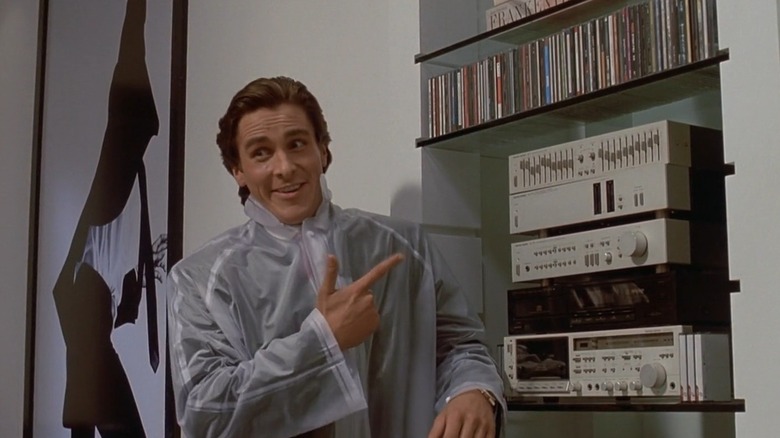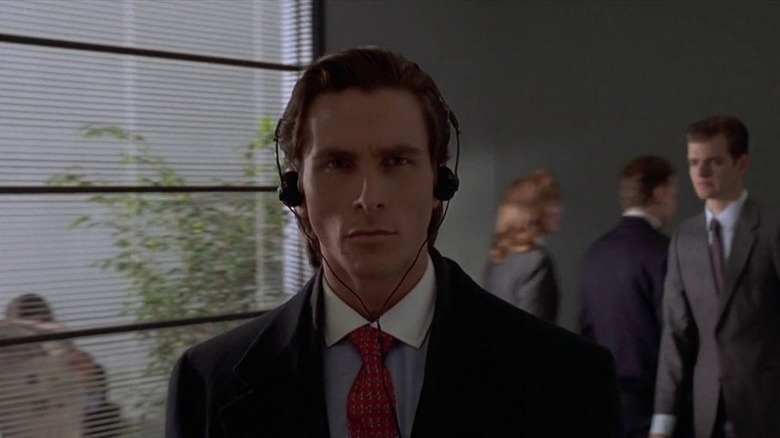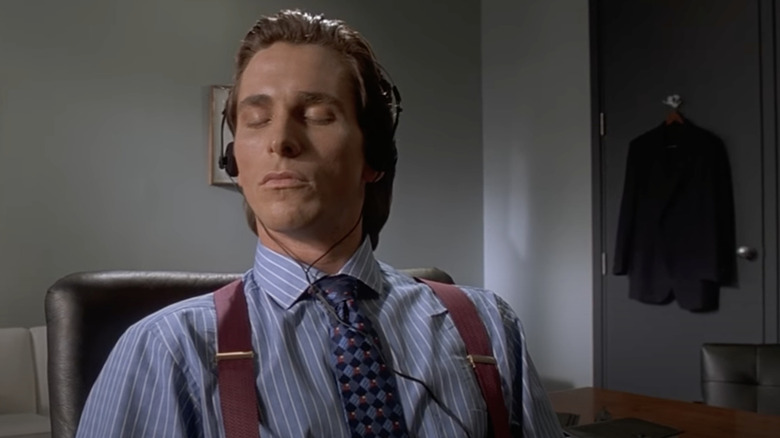Mary Harron Knew The Music Of American Psycho Had To Set A Tone
"American Psycho" satirizes the culture of the 1980s, and you can't talk about the decade and leave out the era's music. The '80s were a conservative decade, with an ascendant political right-wing, the financialization of the global economy, and more commercial art compared with the subversiveness of the 1960s and '70s.
Patrick Bateman (Christian Bale in Mary Harron's film version), an avatar of '80s banality and depravity, loves music. Or at least, he tries to. He's frequently seen adorned with a pair of headphones connected to his Walkman. The '80s hits featured in the film are diegetic because they're some of Bateman's favorite songs. The book, written by Bret Easton Ellis, includes these references to music but they pack a greater punch in Harron's film. As cinema has audio and literature does not, we actually hear the music in the scene itself, not just faint echoes of it in our heads while we're reading. Bale's stoic delivery of monologues praising the music also hammers in how empty Bateman's words are.
The black comedy of "American Psycho" gets even better than when cheery, vacuous pop songs like "Hip to be Square" or "Sussudio" are played over gruesome murder or pornography. The scenes are like Bateman himself — pretty coating over an ugly interior. According to Harron, the music was the key ingredient of the film's tone.
Massively popular music
In an Ask Me Anything (AMA) on Reddit, Bret Easton Ellis explained why he referenced the music and artists he did in "American Psycho":
"In a lot of ways Patrick's rants are about wanting to fit into a society that he doesn't believe in. That's where I was, too. At the time. So a lot of the rants came from my frustration as well. Not a lot of research into that. I didn't like any of the music Patrick liked but it was popular at the time and it seemed to reflect a certain kind of mass taste that [Patrick Bateman] wanted to be a part of."
Speaking with Little White Lies, Mary Harron said she felt the book's music choices were perfect. After all, they weren't just fitting satirical picks, their upbeat rhythms would (and did) create hilarious audio/video contrasts. So, Harron decided that she couldn't change the music in the film, no matter the cost:
"It was really hard to get the rights for the music because we couldn't find anything that worked as well as the music mentioned in the book. It had to be glossy, mainstream pop. The more happy the music was, the better it worked [...] It had to be American and it had to be upbeat."
That meant Huey Lewis and the News, Genesis, and Whitney Houston were must-haves for the soundtrack. The film also threw in "Walking on Sunshine" by Katrina And The Waves, the ultimate sunny '80s song. There's a nod to Michael Jackson too when Bateman moonwalks (poorly) before killing Paul Allen (Jared Leto). As Harron said, that last touch was Bale's suggestion.
The pleasures of conformity
The film also changes Patrick Bateman's rehearsed spiels on music from inner monologues to lectures he says aloud. He's trying to show others how well he understands the music, but also how normal he is. Too normal. Take note of his specific praise for the albums he enjoys. He says that "Hip to be Square" is about, "the pleasures of conformity." Of course, that's what he takes from it — Bateman's whole identity is about trying to fit in and he's going insane because he can't.
For Whitney Houston's, "The Greatest Love of All," Bateman opines that, "since it's impossible in this world we live in to empathize with others, we can always empathize with ourselves." Here the mask of sanity is slipping and Bateman's revealing his solipsism. Then again, in 1980s New York City, one of the epicenters of vapidity, is he wrong?
Finally, Genesis and Phil Collins. What's notable here is what Bateman doesn't respond to. He explicitly says that he didn't like Genesis until their 1980 album, "Duke." Their previous work was, in his words, "too artsy, too intellectual."
That leads us to a notable exclusion. In the book, Bateman listens to Talking Heads and even calls them his favorite band. The joke is that obviously Bateman likes the band that wrote "Psycho Killer." Yet none of their music is in the film. Could Mary Harron not secure the rights to their songs? Would "Psycho Killer" be too obvious a needle drop? I think there's another explanation — to make Bateman's music preferences even more pedestrian. Though a quintessential '80s band, Talking Heads had its roots in punk. In 1982, The Oklahoman even wrote, "Talking Heads are not considered mainstream music." For an insecure "buffoon" like Bateman, even a group as popular as Talking Heads would be too far outside the mainstream.


